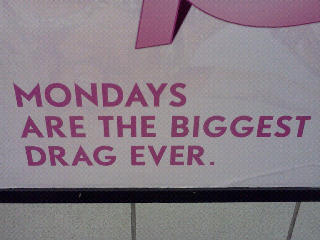The word drag has several meanings. There's the verb form, which means to pull something without lifting. For example: "Don't drag the table; you'll scratch the floor." You can also drag an icon or a file across your computer screen. I'm sure you do that all the time, right? In addition, it's used as an adjective as in drag race, which is when cars compete to see who can accelerate the fastest from a complete stop. Then there's the noun form in the phrase dressed in drag, when guys or girls dress like the opposite sex. There are other meanings, as well.
However, the word drag in this lesson is actually slang, and it means boring, dull, or annoying. We usually use this word when we have to be somewhere or do something that we don't like.
1. Doing laundry is such a drag. I'd rather be writing a ten-page essay.
2. She only takes taxis; she thinks taking the subway is such a drag.
3. Tom never likes to hang out after work. He's such a drag.
4. Did you hear? We have to wear uniforms to work starting next month. What a drag.
5. They say winter is such a drag, so they're staying in Florida until April.
 This photo is part of a tv ad that I saw in a New York City subway station. You probably agree: Mondays can be a drag. However, the word drag in this sentence is actually a pun because it has double meaning in this ad. Mondays are a drag, yes. But the ad is actually for a tv show on Mondays where people who are dressed in drag compete. Funny, right? I'll think of a small lesson on puns in the future.
This photo is part of a tv ad that I saw in a New York City subway station. You probably agree: Mondays can be a drag. However, the word drag in this sentence is actually a pun because it has double meaning in this ad. Mondays are a drag, yes. But the ad is actually for a tv show on Mondays where people who are dressed in drag compete. Funny, right? I'll think of a small lesson on puns in the future.
vocabulary:
a pun - a word used in a sentence in a funny or clever way to show its double meaning; a play on words
Thanks for listening and reading. This is Joe Yu with the small guide site.
Are you on Twitter? Follow me @joeyu2nd.
If you're on Facebook, be a fan of the small guide site.
Alright, catch you later.
However, the word drag in this lesson is actually slang, and it means boring, dull, or annoying. We usually use this word when we have to be somewhere or do something that we don't like.
1. Doing laundry is such a drag. I'd rather be writing a ten-page essay.
2. She only takes taxis; she thinks taking the subway is such a drag.
3. Tom never likes to hang out after work. He's such a drag.
4. Did you hear? We have to wear uniforms to work starting next month. What a drag.
5. They say winter is such a drag, so they're staying in Florida until April.
 This photo is part of a tv ad that I saw in a New York City subway station. You probably agree: Mondays can be a drag. However, the word drag in this sentence is actually a pun because it has double meaning in this ad. Mondays are a drag, yes. But the ad is actually for a tv show on Mondays where people who are dressed in drag compete. Funny, right? I'll think of a small lesson on puns in the future.
This photo is part of a tv ad that I saw in a New York City subway station. You probably agree: Mondays can be a drag. However, the word drag in this sentence is actually a pun because it has double meaning in this ad. Mondays are a drag, yes. But the ad is actually for a tv show on Mondays where people who are dressed in drag compete. Funny, right? I'll think of a small lesson on puns in the future.vocabulary:
a pun - a word used in a sentence in a funny or clever way to show its double meaning; a play on words
Thanks for listening and reading. This is Joe Yu with the small guide site.
Are you on Twitter? Follow me @joeyu2nd.
If you're on Facebook, be a fan of the small guide site.
Alright, catch you later.
